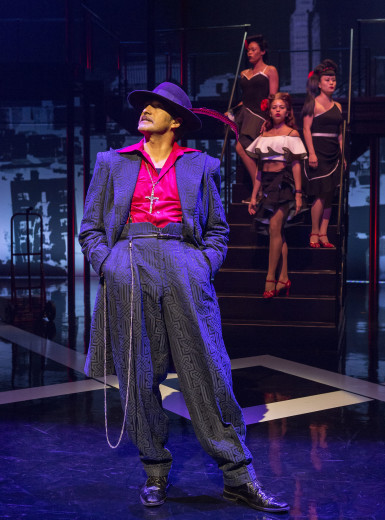‘Zoot Suit’ at the Mark Taper
Breakthrough Musical Gets Thrilling Revival

The timing could not be better for the revival of Zoot Suit at the Mark Taper Forum: it is the theater’s 50th anniversary season, and the play, commissioned specially for it, had its world premiere on the same stage in 1978, the first Chicano work produced by a major company, an immediate and lasting hit, going on to success on stages worldwide and in a 1981 film adaptation.
What’s more, the politics of 2017 make Luis Valdez’s story of young Mexican-Americans wrongly accused and convicted of murder urgently relevant: again, racial and anti-immigrant animus are government policy, and again the independence of the press, police, and courts is in question.
Valdez, the son of Central Valley farmworkers with an early love of theater, co-founded El Teatro Campesino, the Farmworkers’ Theater, in the 1960s, right on cue to join Cesar Chavez’s grape picker strikes, lending its impromptu, defiant agitprop to the marches in the fields and the singing on the picket lines.
Valdez chose to pair two real-life events: the 1942 Sleepy Lagoon murder case, in which four young men, labelled dangerous gangsters by a baying press and denied a fair trial (though the case was later overturned), and the 1943 “Zoot Suit” riots, when rampaging, white military servicemen invaded East LA looking for Chicanos dressed in the signature baggy pants and long jackets with wide lapels to beat up, as the police looked on.
The subject matter was harrowing, but from it Valdez created a joyful musical full of verve, style, and youthful sexiness, a celebration of Mexican-American culture in wartime Los Angeles. The costumes and dancing of the original were legendary, and this production more than clears the bar. But the star of the show, then and now, is El Pachuco, a maybe-imaginary, symbolic figure of Chicano panache and pride, decked out in a feathered hat and a belt chain hanging to his ankles, striking provocative poses, making pronouncements alternately menacing and joking. The role was originated by Edward James Olmos (who took El Pachuco to Broadway and went on to star in the film version and to an illustrious career in film and TV). Here, it is ably carried by the Mexican star Damian Bachir, who brings enough heat and suavity for the challenge.
And the show, despite the propulsive, erotic energy of its dance numbers and gang fights, which can’t help but put a smile on one’s face, remains challenging: not only because of the political and social issues it raises but because much of it is written in full-blown eastside Spanglish, a mixture that is hard to follow if one doesn’t speak both languages.
But the combination is thrilling and thought-provoking, at the same time—and sadly, as relevant now as it was nearly 40 years ago.



